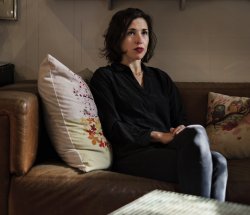
View Profile Page

Charlotte Kent
Associate Professor, Art and Design, Dean's Office, College of the Arts
- Office:
- Calcia Hall
- Email:
- kentc@montclair.edu
- Phone:
- 973-655-4260
- vCard:
- Download vCard
Profile
CHARLOTTE KENT, PhD is Associate Professor of Visual Culture and Head of Visual and Critical Studies at Montclair State University.
She is co-editor with Katherine Guinness of the book, "Contemporary Absurdities, Existential Crises, and Visual Art" (Intellect Books) and an Editor at Large for The Brooklyn Rail with a monthly column on Art & Technology, contributing to many arts magazines and academic journals about the intersection of contemporary art, digital culture, and ecological systems. Raised abroad and near Times Square, she most recently co-authored "Midnight Moment: A Decade of Artists in Times Square" (Phaidon Press, 2024). Her research on the social implications of contemporary art's creative misuse of 21st century technologies continues with "Contemporary Art and Technology: Rethinking Systems, Crises, and the Absurd" (forthcoming, Routledge's Art and Science After 1750 series).
She is the recipient of grants from the National Endowment for the Humanities' Dangers and Opportunities of Technology: Perspectives from the Humanities (2024-2026) for research on concepts of agency as exhibited in arts intersection with "AI" as well as the term's diverse meanings across disciplines; this research has also been supported by Google's Artist + Machine Intelligence program (2023, 2024). In 2023, she was the inaugural Scholar-in-Residence at NXT Museum, where she co-curated with Jesse Damiani the RealTime exhibit, "Lilypads: Mediating Exponential Systems."
She serves on the College Art Association's Committee on Intellectual Property (2025-2028) and on the Editorial Board for Technoetic Arts (2023-ongoing), with past service for various institutions including founding the Artist Fellowship while on the Board of Governors for the National Arts Club, New York City.
She is a graduate of the CUNY Graduate Center, St. John’s College, Phillips Academy Andover, and The Writer's Institute. She currently lives in New York City.
Specialization
Visual culture, narratology, contemporary art, digital culture, emergent technologies, history of aesthetics, ekphrasis, deconstruction, critical theory, surrealism, and the absurd.
Links
Montclair State University does not endorse the views or opinions expressed in a faculty member's webpage or website. Consistent with the principles of academic freedom, the content provided is that of the author and does not express the opinions or views of Montclair State University.
- MSU Announcement of Fall 2024 activities
- Contemporary Absurdities, Existential Crises, and Visual Art (Intellect Press, 2024)
- Midnight Moment: A Decade of Artists in Times Square (Phaidon Press, 2024)
- Ckent.Art
- Brooklyn Rail monthly column on art & technology, reviews + more
- Nxt Museum Scholar-in Residence exhibition essay, Lilypads: Mediating Exponential Systems
- Wired Magazine contributions
- Creative Research Center, 2019-2020 Editor + essay, Waiting for the Absurd
- Chronicle of Higher Education article "To Solve the Skills Gap in Hiring, Establish Expectations in the Classroom"